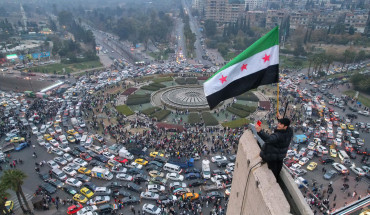Listen closely to the debate in Tehran about Syria and you will detect great unease. There is an underlying fear—inside both the moderate and the hard-line camps of the regime—that Iran won the war but is in danger of losing out in the post-war period that will follow. This apprehension has always been there. But it has become markedly more distinct as the principal foreign powers that intervened in Syria—Russia, Turkey and the U.S.—set their sights on the long-term endgame.
With ISIS defeated, the Gulf Arab States distracted by the Yemeni civil war and intra-Gulf rivalries, and a U.S. that is still on the fence about Syria, the Iranians might want to pat themselves on the back (as some do) and declare victory in Syria. Tehran came in early and heavy in support of the Assad regime.
For it to declare itself among the geopolitical winners of this nastiest of wars is not unreasonable. For Tehran, losing Syria to the Gulf-backed opposition was always the biggest nightmare. That scenario has been avoided.
How, then, do we explain the enduring apprehension in Tehran? Put simply, the soon-to-be-settled Syrian war comes at a time when Iran as a nation is at an ideological crossroads. In the most recent popular protests in Iran that erupted on Dec. 28, 2017, many of the angry slogans were aimed at Tehran’s costly—and ideologically driven—foreign policy (for example, “My life for Iran, not Gaza, not Lebanon”).
The Iranian regime’s interventions in the Arab world have never been as popularly contested inside Iran as they are today. Given this pushback from below, can the Iranian leadership up the ante in Syria? This is an unsettled question in Tehran.
In truth, the intervention in Syria was always a war of choice by Iran. The notion that the rise of ISIS posed an existential threat to Iranian domestic security was a narrative of convenience. When the rabidly anti-Shiite and anti-Iran Taliban, which is not dissimilar to ISIS, took control next door in Afghanistan in 1994 and ruled for seven years, Tehran never intervened militarily. Why was fighting ISIS in relatively distant Syria so paramount?
In mid-2011, Tehran did a cost-benefit analysis and determined it had a fighting chance to keep its ally, Assad, in power. In so doing, it could also protect Hezbollah, its Shiite Lebanese darling, from the turmoil set in motion by the so-called Arab Spring. Seven years later, can the Islamic Republic of Iran justify to its people—plagued as they are by deep socioeconomic troubles—its commitment to an open- ended presence in Syria? One thing is for sure: the cost of waging war in Syria will be dwarfed by the cost of the Syrian reconstruction.
No doubt, foreign pet projects have always been the Iranian regime’s soft spot. But the need to maintain political stability on the home front supersedes all else, including the fate of Assad and Syria. Ayatollah Ali Khamenei, Hassan Rouhani, and the rest of the Iranian leadership know full well that at street level across Iran, the Syrian venture—as well as Iran’s other Arab pursuits—are overwhelmingly viewed as nothing but a drain.
The kind of national introspection that Iran is undergoing at the moment also directly touches that most cherished of ideological causes of the Islamic Republic: the enmity toward Israel. At home, Iran’s costly presence in the Levant is sold as necessary to keep alive the so-called Axis of Resistance against the Jewish state.
While the average Iranian tends not to fathom the reasons behind Tehran’s opposition to Israel, Iran’s economic troubles are making more and more Iranians ask if it is worth the price.
Geopolitical maneuverings by on-and-off partners and rivals such as Russia and Turkey will largely shape Iran’s Syrian calculations in the short term. What cannot be overlooked, however, is the rising anger within Iranian society that has begun to defy the policy preferences of the Islamic Republic like never before. As Iran’s Syria policy evolves, the role of the Iranian people in shaping Tehran’s calculus should not be underestimated.
This analysis was first posted as part of a debate published by the BESA Center; see here for the full debate.
Photo: LOUAI BESHARA/AFP/Getty Images
The Middle East Institute (MEI) is an independent, non-partisan, non-for-profit, educational organization. It does not engage in advocacy and its scholars’ opinions are their own. MEI welcomes financial donations, but retains sole editorial control over its work and its publications reflect only the authors’ views. For a listing of MEI donors, please click here.













